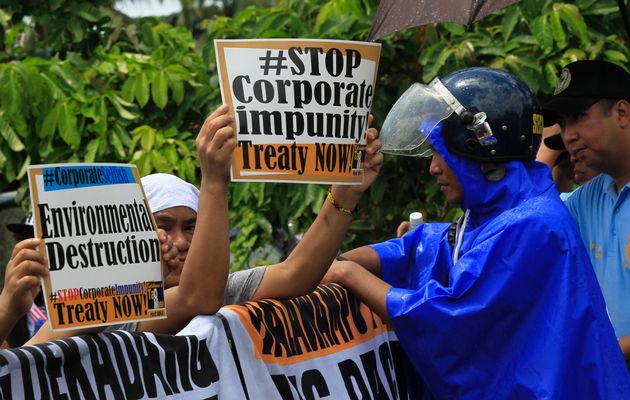People hold placards in front of anti-riot police as they protest against environmental degradation which they believe to be caused by mining activity and on climate change near the Chamber of Mines of the Philippines Convention in Pasay city, metro Manila, September 16, 2014. Image by: ROMEO RANOCO / REUTERS
Disasters last year displaced three times more people than violent conflicts, showing the urgent need to improve resilience for vulnerable people when fighting climate change
The Norwegian Refugee Council, an independent group that focuses on emergency aid, released the findings ahead of a United Nations summit on Tuesday aimed at building momentum for a global agreement on climate change.
The report said that 22 million people were displaced in 2013 due to disasters brought on by natural hazards, nearly three times the number who were forced from their homes due to violence.
The problem has been worsening, with roughly twice as many people displaced around the world due to disasters now than in the 1970s, even as better forecasting and relief operations have reduced the number of deaths.
“It’s a wake-up call, I think, to world leaders coming here — as bad as it is today, it would be dramatically worse unless much more is invested in resilience,” said Jan Egeland, the Norwegian Refugee Council’s secretary general.
“We have to make people in the Philippines or Chad or in Haiti as resilient as we are in Norway or in many parts of the United States,” he told AFP.
Egeland is the former UN emergency relief coordinator who played a high-profile role drumming up international support after the 2004 Indian Ocean tsunami.
He cited the experience as a model, saying that the more than $13 billion that poured in after the tsunami went not only for reconstruction but built up resilience for future disasters.
Such an effort needs to happen on a global scale as “we need to get people out of this vicious cycle of being vulnerable and therefore being hit very hard again,” he said.
UN Secretary-General Ban Ki-moon has called Tuesday’s summit to mobilize world leaders before the 2015 conference in Paris that is meant to draft a new global agreement on climate change.
The Norwegian study pointed to findings of a UN-led scientific panel, the Intergovernmental Panel on Climate Change, which has said that human activity is contributing to the greater frequency and intensity of disasters around the planet.
But the report said that a sharp rise in urbanization, and bad planning, were also factors in explaining the steep rise in disaster displacement.
“We are not saying here that it’s climate change that has explained the increase. It’s just as much, or more, population growth and urbanization, bad planning and more exposure to the elements,” Egeland said.
More than 80 percent of the people displaced by natural disasters last year were in Asia, the report found. The Philippines suffered the two most disruptive disasters last year, with typhoons Haiyan — also known as Yolanda — and Trami together displacing 5.8 million people.
Relative to population size, eight of the 20 most disruptive natural disasters were in sub-Saharan Africa. The study warned of growing risks to Africa as the continent experiences higher population growth than other regions.
Wealthy nations were not immune, with a typhoon in Japan’s Chubu region, tornadoes in the US state of Oklahoma and floods in the Canadian province of Alberta together displacing nearly 600,000 people.
The study also warned of growing risks of natural disasters hitting nations that are also in conflict. It pointed to the 2010 floods that swamped Pakistan as an example of a disaster hitting a fragile state.



